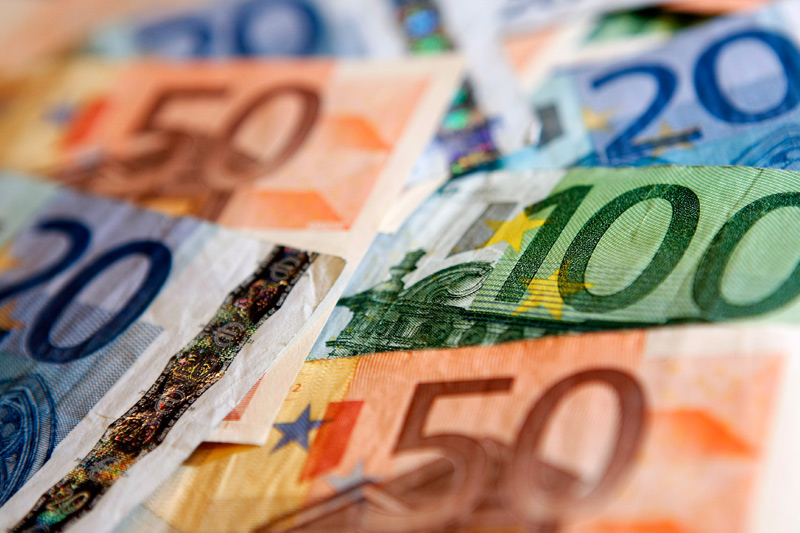Investing.com - The euro remained weaker against its major counterparts on Tuesday, as investors looked ahead to a European Union summit, amid speculation that European leaders could agree on fresh measures to tackle the crisis in the euro zone.
During European late morning trade, the euro was down against the U.S. dollar, with EUR/USD shedding 0.57% to hit 1.2744.
Investors remained wary ahead of Wednesday’s EU summit meeting amid concerns over a divide between France's new President Francois Hollande, who favors measures designed to support growth and pro-austerity Germany.
President Hollande was expected to propose the introduction of joint euro bonds at the summit, but Germany has repeatedly resisted the idea, arguing they would lessen pressure for heavily indebted countries to get their finances in order.
Sentiment was also hit after the Organization for Economic Cooperation and Development cut its growth forecasts for the euro zone for 2012 and 2013 and warned that a "combination of enduring financial fragility, rising unemployment and social pain may spark political contagion and adverse market reaction."
Elsewhere, Spain successful auctioned EUR2.5 billion of short-term debt earlier, but the country’s borrowing costs rose, pressured higher by sustained concerns over the economic outlook and the health of the country’s banking sector.
Elsewhere, the single currency was lower against the pound, with EUR/GBP sliding 0.14% to hit 0.8082.
Earlier Tuesday, official data showed that consumer price inflation in the U.K. eased to a two-year low of 3% in April, adding to speculation that the Bank of England could ease monetary policy further in order to shore up growth.
Meanwhile, the managing director of the International Fund Christine Lagarde said Tuesday that the U.K. government should ease the pace of its austerity program if economic growth remains too slow, while additional fiscal stimulus should also be considered.
The comments came following an IMF review of the U.K. economy.
A separate report showed that public sector net borrowing in the U.K. posted an unexpected surplus of GBP18.8 billion in April, boosted by a Royal Mail asset transfer. Analysts had forecast a public sector deficit of GBP5.8 billion.
The euro dipped against the yen and the Swiss franc, with EUR/JPY inching down 0.04% to hit 101.61 and EUR/CHF easing down 0.01% to hit 1.2010.
Elsewhere, the shared currency was broadly lower against the Canadian, Australian and New Zealand dollars, with EUR/CAD shedding 0.43% to hit 1.2983, EUR/AUD slipping 0.08% to hit 1.2914 and EUR/NZD edging up 0.02% to hit 1.6757.
Earlier Tuesday, official data showed that second quarter inflation expectations in New Zealand ticked down to 2.4%, from 2.5% in the three months to March, dampening expectations for a rate hike by the country’s central bank in the coming months.
Later in the day, the U.S. was to release industry data on existing home sales.
During European late morning trade, the euro was down against the U.S. dollar, with EUR/USD shedding 0.57% to hit 1.2744.
Investors remained wary ahead of Wednesday’s EU summit meeting amid concerns over a divide between France's new President Francois Hollande, who favors measures designed to support growth and pro-austerity Germany.
President Hollande was expected to propose the introduction of joint euro bonds at the summit, but Germany has repeatedly resisted the idea, arguing they would lessen pressure for heavily indebted countries to get their finances in order.
Sentiment was also hit after the Organization for Economic Cooperation and Development cut its growth forecasts for the euro zone for 2012 and 2013 and warned that a "combination of enduring financial fragility, rising unemployment and social pain may spark political contagion and adverse market reaction."
Elsewhere, Spain successful auctioned EUR2.5 billion of short-term debt earlier, but the country’s borrowing costs rose, pressured higher by sustained concerns over the economic outlook and the health of the country’s banking sector.
Elsewhere, the single currency was lower against the pound, with EUR/GBP sliding 0.14% to hit 0.8082.
Earlier Tuesday, official data showed that consumer price inflation in the U.K. eased to a two-year low of 3% in April, adding to speculation that the Bank of England could ease monetary policy further in order to shore up growth.
Meanwhile, the managing director of the International Fund Christine Lagarde said Tuesday that the U.K. government should ease the pace of its austerity program if economic growth remains too slow, while additional fiscal stimulus should also be considered.
The comments came following an IMF review of the U.K. economy.
A separate report showed that public sector net borrowing in the U.K. posted an unexpected surplus of GBP18.8 billion in April, boosted by a Royal Mail asset transfer. Analysts had forecast a public sector deficit of GBP5.8 billion.
The euro dipped against the yen and the Swiss franc, with EUR/JPY inching down 0.04% to hit 101.61 and EUR/CHF easing down 0.01% to hit 1.2010.
Elsewhere, the shared currency was broadly lower against the Canadian, Australian and New Zealand dollars, with EUR/CAD shedding 0.43% to hit 1.2983, EUR/AUD slipping 0.08% to hit 1.2914 and EUR/NZD edging up 0.02% to hit 1.6757.
Earlier Tuesday, official data showed that second quarter inflation expectations in New Zealand ticked down to 2.4%, from 2.5% in the three months to March, dampening expectations for a rate hike by the country’s central bank in the coming months.
Later in the day, the U.S. was to release industry data on existing home sales.
